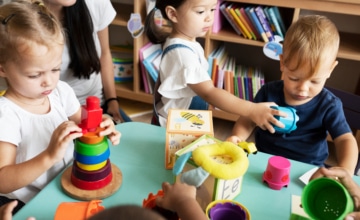Nichole Paradis, Alliance for the Advancement of Infant Mental Health, Southgate, Michigan
Kira Johnson, Mississippi Association of Infant Mental Health, Jackson, Mississippi
Zsalanda Richardson, The Children’s Center, Detroit, Michigan

Abstract
With an average annual salary of just over $16,000, the work of early childhood education professionals is grossly undervalued and leads to high turnover rates. And yet, the quality and consistency of the care they provide to infants and young children has a lasting impact on their brain development and social–emotional well-being. This article makes a case for demonstrating the value of their work through the provision of reflective supervision/consultation (RSC) in early childhood education settings. The authors share research, evidence-based practice standards, and case illustrations to review the impact of RSC on reflective functioning, job satisfaction/burnout, insight, and secondary trauma. They explore how these impacts might strengthen the capacity of the early childhood education workforce, including administrative leadership, to grow and respond in ways that benefit the infants, young children, and families they serve.
Approximately 6 million infants and toddlers in the US are in out-of-home care settings, with approximately half of children under 3 spending 25 hours a week in care with someone other than their parents (For Our Babies, n.d.). The relationships that infants and young children form with their caregivers in these settings is critical to their development, particularly their brain development and social and emotional well-being. For years, leaders in the infant and early childhood mental health (IECMH) field have made the case for providing reflective supervision/consultation (RSC) to early childhood education professionals as a workforce development activity that both supports the emotional component of the work and strengthens capacities to respond sensitively to the infants and young children in their care (Bernstein & Edwards, 2012; Einhorn, 2019; Emde, 2009; Virmani & Ontai, 2010; Weigand, 2007). And now in the midst of the “twin pandemics” of COVID-19 and on-going structural racism, the stress on early childhood education professionals is exponentially higher. This article will explore how support for early childhood education professionals in the form of RSC can provide a space to acknowledge the difficulties of their work, make sense of the emotional responses that inevitably arise, promote insight and reflective functioning, and decrease burnout (see Box 1)—all which may lead to lower rates of staff turnover and ultimately benefit the babies and young children in their care, including their families.
What Is RSC?
RSC has been difficult to define. For the purposes of this article, RSC refers to regular, ongoing support to increase the reflective capacity of early childhood education professionals. RSC is collaborative and offered in the context of a relationship with a provider with whom trust is built over time. RSC uses emotions as data to explore the network of relationships surrounding an infant or young child. RSC provides reflective support when painful feelings arise.
The following definitions are key:
Although reflective supervision may incorporate administrative and clinical tasks, and include attention to collaboration within learning relationships, its primary focus is the shared exploration of the emotional content of infant and family work as expressed in relationships between parents and infants, parents and practitioners, and supervisors and practitioners (Weatherson & Barron, 2009).
The essential features of this supervisory relationship are reflection, collaboration, and regularity of occurrence (Eggbeer et al., 2007).
Finally, it may be helpful to distinguish between reflective supervision (RS) and reflective consultation (RC). RS is typically provided by an individual’s or group’s program supervisor who is employed by the same organization. RC refers to when an organization hires a consultant from outside the organization to work with an individual and/or a group (Alliance for the Advancement of Infant Mental Health, 2018). See Box 1 for additional definitions.
Why Is RSC Important in Early Childhood Education?
While the research base on the impact of RSC is growing, it is still limited. Preliminary studies offer promising indications that participation in RSC leads to positive change in the recipient (Frosch et al., 2018; Harrison, 2016; Shea, 2020; Sussman-Stillman et al., 2020). In the next section we review the impact of RSC on recipient’s reflective functioning, job satisfaction/burnout, insight, and secondary trauma. Further, we explore how these impacts strengthen the capacity of the early childhood education workforce to grow and respond in ways that benefit the infants, young children, and families they serve.
Box 1. Definitions
Burnout: A state of emotional, mental, and often physical exhaustion brought on by prolonged or repeated stress, most often caused by problems at work. This type of burnout is characterized by cynicism, depression, and lethargy (Psychology Today, n.d.).
Insight: The ability to inhabit another’s mind or identify motives that underlie behavior.
Reflective functioning: The term used for operationalizing mentalization, a process by which we understand, interpret, and make meaning of others’ behavior in light of the thoughts, feelings, beliefs, wishes, desires, and plans that underlie and motivate that behavior (Fonagy & Target, 2005).
RSC and Reflective Functioning
Reflective functioning refers to the process by which caregivers understand, interpret, and make meaning of an infant or young child’s behavior by considering the thoughts, feelings, and desires that explain that behavior (Fonagy & Target, 2005). This ability to understand the perspective of the child enables a sensitive and appropriate response to behaviors like crying, whining, or hitting. It is the experience, over time, of sensitive caregiver responses that allow the infant to appropriately use their caregiver as a secure base and that support the child’s capacity for self-soothing (Jurie, 2011). Participation in RSC, with its relationship-based and reflective approach, supports reflective functioning and can thereby lead to more attuned responses from caregivers to children in distress.
An evaluation of an RC pilot program offered preliminary findings on RC’s impact on recipients’ approach to reflection in their work. The pilot provided RC in groups, via distance technology, to infant and early childhood program professionals from Pennsylvania’s Office of Child Development and Early Learning’s PA Key. The participants were IECMH consultants, preschool program specialists, infant–toddler specialists, their program supervisors, and program managers (Shea et al., 2020). Preliminary results from the mixed-method evaluation found that the RC groups increased participants’ reflective practice and relationship-based skills. For example, participants more often considered challenges in professional relationships as a potential source for difficulties encountered on the job and were able to identify strategies such as perspective taking and seeking connection with others to address those difficulties (Shea et al.). Though these data were from a relatively small sample representing a variety of professional roles, it offers a compelling case.
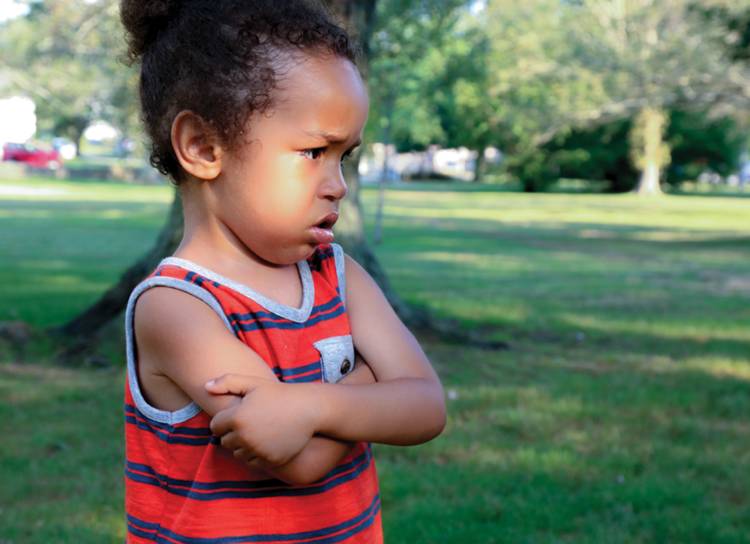
The ability to understand the perspective of the child enables a sensitive and appropriate response to behaviors like crying, whining, or hitting. Photo: Olga Enger/shutterstock
In many sectors of the workforce, including early childhood education, the invitation for reflection may not be initially welcomed. Professionals may be unsure of what to expect and slow to engage.
It can take time, regularity, and trust in the process before changes in reflective functioning can be observed, as illustrated in the following case example.
RSC Promotes Professional Development
Case illustrations come from the work of the authors. The names of the RSC recipients have been changed to protect confidentiality.
Zsalanda provides RS to a group of 10 early educators on the outskirts of an urban Michigan city. The program at which they are employed requires that they participate in RS. In the beginning of Zsalanda’s work with the group, meeting for RS was not at the top of their list of things they wanted to do. When Zsalanda met with them for the first time, she was not quite sure how to convince them to engage in RS. Zsalanda began by explaining the basics of RS. The early educators listened as Zsalanda described the importance of meeting regularly, but there was push back about their schedules and time constraints. Zsalanda administered a quick survey to find days and times to meet that were responsive to the early educators’ schedules. Attendance at meetings in the beginning was hit and miss. Even though meetings were scheduled based on the survey responses, Zsalanda was still met with excuses and educators’ nonattendance.
Zsalanda modeled the number one basic element of RS, “consistency.” Every month she sent out reminders of the meeting and held the space regardless of her worries that they would not show up. And eventually they did begin to show up. Over time, the group came to deeply value the RS time. This day became known as their RS day. If a teacher missed a meeting, they would call Zsalanda to inquire about a day to reschedule. If Zsalanda had to reschedule, the group reminded her that RS was missed. Group members questioned when a fellow teacher was absent, and if a teacher missed multiple meetings, the rest of the group wondered together about the disruption it caused.
Over the years, turnover occurred within the program, which led to the replacement of a few group members. The group dynamic changed a little however, with some of the original members taking on the responsibility of making the new ones feel comfortable. The educators took it upon themselves to remind their colleagues about the scheduled RS meeting.
Currently, they are a group of committed early education professionals who attend RS regularly. Despite their busy schedules, they have taken ownership of their professional development. They readily explore their relationships between themselves and the families they serve. They lead RS sessions by reflecting on their feelings about their work and on how their feelings may affect their relationships with the infants and young children in their care.
RSC and Job Satisfaction/Reduced Burnout
Feeling unprepared and undervalued are contributors to burnout, which can be defined as a state of emotional, mental, and often physical exhaustion brought on by prolonged or repeated stress, most often caused by problems at work. According to a 2016 report, the national turnover rate in early childhood education is about 30% each year (Ludden, 2016). And while low pay is widely recognized as the most critical factor in turnover, poor working conditions, including not feeling prepared or valued, play a role in the frequency at which staff leave (Ludden, 2016). Staff burnout is bad for babies; the social–emotional development of infants and young children can be harmed when there is high turnover in early childhood education settings (Korjenevitch & Dunifon, 2010).
RSC has potential to reduce staff burnout in early education settings. In one small qualitative study, the perspectives of school-based early childhood professionals who received RSC were described and included feeling heard, validated, and affirmed; reducing feelings of isolation; shifting perspective; addressing biases; feeling co-regulated; and feeling self-efficacious, among others (Harrison, 2016). The author concluded, “Given that a central purpose of reflective consultation is to support practitioners in the field, the model validates that in this case, the reflective consultation group provided a supportive, safe, relational experience that practitioners valued” (p. 680).
Another example comes from a study of the use of the Reflective Supervision Self-Efficacy Scale for Supervisees, a self-report measure that has been used in previous evaluations and is designed to assess perceived reflective practice self-efficacy for infant mental health-home visiting therapists. In this 12-month study, Shea and colleagues found a connection that indicated when participants described their RS relationship was trusting, safe, and open, this led to decreased burnout scores on a self-report measure, (Shea et al., 2020). These findings are preliminary and limited, but they do add to the case for RSC as a strategy to reduce burnout and, by extension, to reduce turnover.
The role that RSC can play in helping early childhood education professionals feel heard and valued is illustrated in the following case example.
Supervision Enhances Meaning and Satisfaction
Jesse is an Early Head Start teacher in an urban region in Michigan. Prior to receiving RS, Jesse expressed that she had always had one foot in and one foot out the door in regard to her job. “I liked working with the babies. I loved my job. But I did not like the lack of support.” When Zsalanda started meeting with Jesse to provide RS, she explained the basic elements of consistency, confidentiality, and, most important, the safety of the meeting space. After 5 years of RS, Jesse reported feeling more settled in her position. She expressed that she continues to show up every day because she knows she is making a huge difference. Through Jesse’s active engagement in RS over 5 years, Zsalanda observed Jesse’s professional relationships grow, particularly with the parents of the infants in her classroom. Jesse expressed that she has a different perspective on her job since she has engaged in RS. When asked what that perspective is, she expressed that she “just feels heard.”
Jesse’s experience suggests that RS can reduce teacher turnover, which in turn helps provide the consistent caregiver–child relationships that infants and toddlers need.
RSC and Insight
Insight can be described as the capacity for a deep and intuitive understanding of another person. And like reflective functioning, insight can be particularly important for those caring for infants and young children under stress or experiencing trauma. One study found that caregivers who were rated as insightful (i.e., more open and curious about a young child’s inner experience) had a protective effect on those who had been exposed to violence, as there were fewer reported problem behaviors (Gray et al., 2015). So how do RSC providers promote insight among early childhood education professionals? What is RSC’s role in promoting insight?
One study set out to examine the role of RS in caregivers’ capacity to understand a child’s behavior in an open and accepting manner. The study used the Insightfulness Assessment, (i.e., complexity, insight, openness, acceptance, richness, and coherence) and found a positive association with RS and training that was not associated with traditional supervision and training (Virmani & Ontai, 2010). The results of this study offered evidence that RS might have an impact on caregivers’ ability to be insightful about the children in their care.
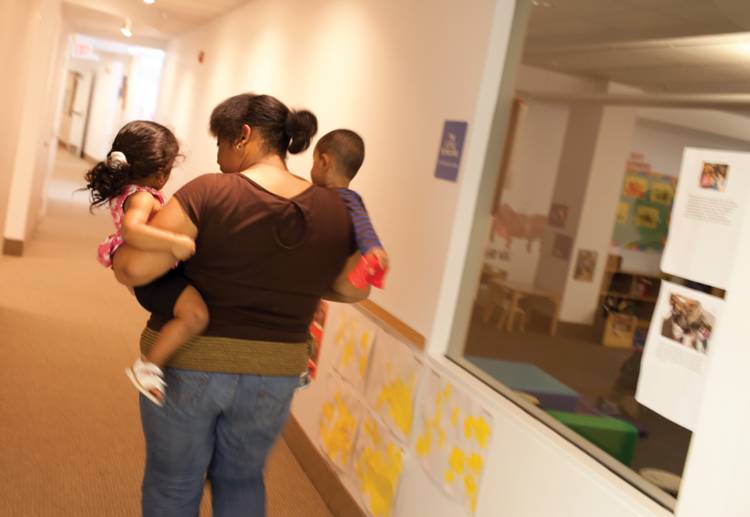
In many sectors of the workforce, including early childhood education, the invitation for reflection may not be initially welcomed. Photo: © ZERO TO THREE
When integrated into child care settings, RS affords caregivers with consistent, predictable opportunities to reflect on their interactions with children and, in turn, to think more deeply about the children in their care. It is through the process of reflection with skilled supervisors that caregivers learn to ask important questions that help them gain insight into the thoughts and motivation underlying young children’s behavior, ultimately allowing them to see children with more depth and understanding. Caregivers who think deeply about children in their care are likely to respond to children with greater attunement and sensitivity (pp. 29–30).
RSC and Secondary Trauma
Early childhood education professionals will inevitably encounter infants, young children, and families who have experienced or are experiencing trauma (e.g., interpersonal violence, community violence, natural disasters, separations, grief, and loss). This second-hand exposure to trauma can take a toll on the teachers who care so deeply about the young ones in their care. The intense feelings aroused can lead to concerns about vicarious trauma and compassion fatigue. RSC offers an opportunity to slow down, step back, and to think deeply about what the caregiver is observing, and to do so in the context of a reflective and trusting relationship where emotional support is made available (Osofsky, 2009). In the current experiences of the COVID pandemic, often exacerbated by systemic racism and oppression, this kind of reflective support feels more important than ever.
The following case illustrates the power of RSC in the wake of tragedy and grief.
RSC Mitigates Trauma
Mrs. Andrews is a Head Start teacher with more than 12 years of experience. She teaches in the 4-year-old classroom in one of the largest Head Start centers in Jackson, Mississippi. The children who attend this center come from extremely low-income households. Mrs. Andrews grew up in the neighborhood adjacent to the Head Start center. She is known for supporting and nurturing the children in her classroom, and their families, always looking for their strengths.
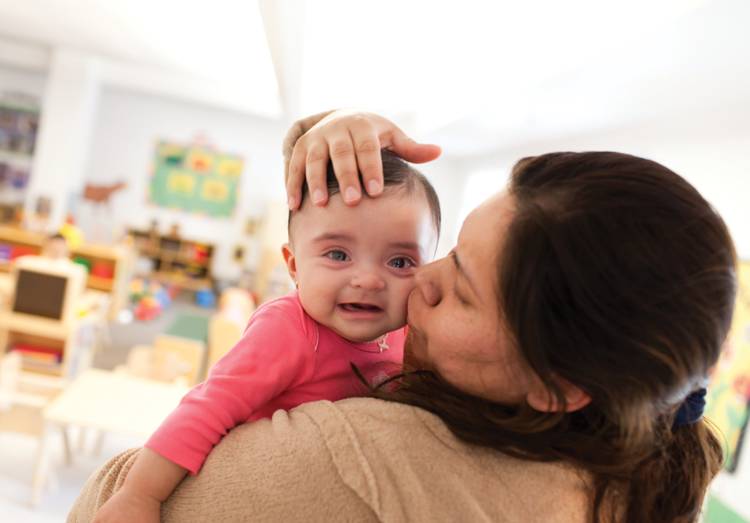
Feeling unprepared and undervalued are contributors to burnout. Photo: © ZERO TO THREE
A student at the center was struck by a car and killed while attempting to cross the street to his apartment complex after getting off the school bus. Other children and staff witnessed the accident. Immediately following the accident, the Head Start center offered grief counseling to students and employees, but Mrs. Andrews declined. She expressed she “wanted to be strong for her students.” After a week or so, a few of Mrs. Andrews’ colleagues noticed a change in her demeanor. She appeared distant, distracted, and less engaged with her students. Mrs. Andrews was known for running an orderly classroom. But the class appeared to lack its usual organization and structure after the death of the student.
Mrs. Andrews agreed to meet with Kira, the center’s provider of RSC, during the children’s naptime. Kira explored with Mrs. Andrews the impact of death on the classroom and how she could assist the children in processing their feelings regarding the loss of a friend. Mrs. Andrews shared with Kira that she was surprised by the children’s insight and compassion. She realized that the children were processing their grief while she was holding her hurt in. Kira validated her feelings about how difficult this loss was for the children and for Mrs. Andrews as well. Mrs. Andrews shared her personal experience involving grief and loss. The loss of her student triggered feelings from her past. Kira listened and offered warmth and compassion, along with suggestions for managing grief.
Mrs. Andrews was encouraged to take off work for a few wellness days. When Mrs. Andrews returned, the weekly individual RSC continued. During sessions, Kira and Mrs. Andrews discussed grief triggers and plans to support the students. They practiced responding to the children when there were questions about their friend. They reviewed ways to implement child-driven small group and circle activities that encouraged expression and healing.
Mrs. Andrews has continued to participate in RSC. She has become one of the biggest advocates for RSC at her center. Mrs. Andrews has identified that RSC led to greater self-awareness, which has led to better services for families. She understands now that she can use RSC time for herself to more effectively care for and educate the children in her care. The ongoing support of RSC has helped Mrs. Andrews remain an effective educator and mitigate the trauma associated with the tragic loss of a student.
Making a Case for RSC for ECE Leaders
As recognition of the value of RSC in early childhood education settings grows, it is critical to consider the parallel process: When program leaders (including administrators, supervisors, and managers) receive reflective support, they are better prepared to offer the same to their staff, who in turn are better prepared to provide reflective support to the caregivers, families, infants, and young children they serve.
Experienced providers of RSC who are now in leadership roles make a compelling case for why leaders should themselves engage in RC:
In the absence of RSC, how will a leader have the space to explore the work in more depth, to manage annoyance at a particularly stubborn employee, to practice slowing down and listening deeply to one’s own internal process as well as that of the team? How will the leader be allowed to experience the vulnerability that inevitably arises when one is on the cusp of learning something new that might require them to change their practice? These are important questions that lead us to assert that all professionals in the infant and early childhood system, including and arguably especially leaders, should be receiving consistent, relationship-based RSC (Schmelzer & Eidson, 2020).
The call for RSC for leaders has some support in the literature, albeit preliminary and limited. Qualitative data collected from both direct service providers and supervisors/administrators in an early childhood education system showed they were more likely to engage in reflection rather than problem solving after participating in group RSC for 1 year (Shea, 2020). There were also indications that RSC participation helped all participants feel more confident about their ability to apply reflective practice principles into their work. This integration of reflection by those in direct service roles, as well as those in management and decision-making positions, can hugely benefit organizations that play such a critical role in infant and young child development.
Limitations and Considerations
Despite a growing body of evidence that RSC is beneficial to both professionals and the children and families served, there are still many questions about the type of RSC (individual or group) that might be most effective and the dose (for how long and how often). Moreover, not all infant and early childhood professionals feel ready or willing to engage in RSC. Careful readiness assessment and preparation may be particularly important in the early childhood education sector, where RS is a new and unfamiliar type of supervision.
RSC requires time and resources, both of which are incredibly scarce in early childhood education settings. This particular barrier may be more easily overcome once the impact on reducing staff turnover has been more broadly documented.
It is also necessary to acknowledge the limitations of the current RSC model/construct, for example the model defined in the Best Practice Guidelines for Reflective Supervision/Consultation (Alliance for the Advancement of Infant Mental Health, 2018). The model of RSC described within this document was created by practitioners from the dominant culture based on literature from scholars who also come from the dominant culture. Black, Indigenous, and people of color (BIPOC) who are leaders in the IECMH field have raised awareness of this problem, leading the Alliance to plan for a reexamination of the model to identify and eliminate the ways in which White supremacy shows up. A reconstruction of this RSC model will more closely reflect the Diversity-Informed Tenets for Work With Infants, Children, and Families (Thomas et al., 2019) and will reflect the input of BIPOC professionals who provide and receive RSC, as well as allies. The hope is for a revised model that recognizes and respects nondominant bodies of knowledge, that works to acknowledge privilege and combat racism, that makes space and creates pathways by providing more equitable access to members of the workforce who come from historically marginalized groups, and that embraces the knowledge that self-awareness leads to better services for families.
Conclusion
While the evidence base is growing slowly, there is strong agreement in the IECMH field that RSC is an effective practice for all the sectors of the workforce who touch the lives of infants, young children, caregivers, and families. There is growing agreement around a common definition of RSC (e.g., the Reflective Interaction Observation Scale, Watson et al., 2016) to identify the essential elements and collaborative tasks of the process. And a number of tools are achieving reliability and validity to assist in measuring the impact of RSC (e.g., Reflective Supervision Self-Efficacy Scale for Supervisees, Shea et al., 2020; Reflective Supervision Rating Scale, Gallen et al., 2016; and Provider Reflective Process Assessment Scales, Heller & Ash, 2016). To ensure that RSC is delivered by skilled providers, there are credentialing systems that define and document competency (e.g., Endorsement for Culturally Sensitive, Relationship-Focused Practice Promoting Infant and Early Childhood Mental Health®), most often offered by state associations for infant mental health. The state associations are often resources for building the capacity to provide RSC, providing training about how to deliver RSC, and offering connections to skilled providers.
The role that early childhood education professionals play in the social–emotional development of infants and young children is critical. While the work can be rewarding, it can also be overwhelming and undervalued. And when caring for infants or young children who are impacted by trauma, the work can be painful.
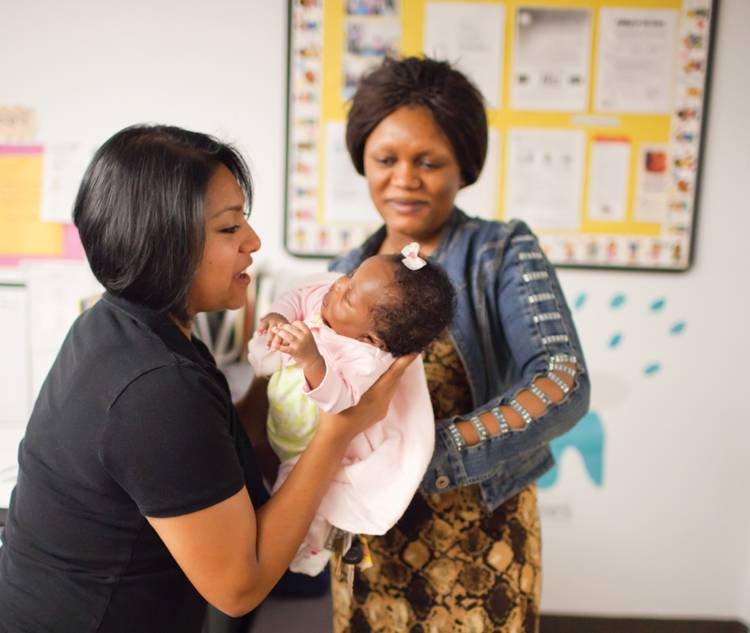
Reflective supervision/consultation requires time and resources, both of which are incredibly scarce in early childhood education settings. Photo: © ZERO TO THREE
It cannot be overstated that higher pay (i.e., a living wage) is critically important to this sector. The average salary for an early childhood education worker is $16,283 (Data USA, n.d.-a). In terms of composition of the workforce, 92.3% are women and 14.9% are Black (compared to 11.7% of the general population in the US (Data USA, n.d.-b). These statistics make clear that early childhood education professionals are subject to gender and race income disparities. No wonder that they feel undervalued (Greene et al., this issue, p. 59).
While IECMH and RSC leaders work for policy changes that demonstrate the value of the essential nature of this work in monetary terms, they must also meet the need for professional development that improves reflective functioning and insight, reduces burnout, and addresses secondary trauma. The evidence is building to support a long-held belief that RSC is not just an effective practice in the early childhood education sector, but an imperative for both the professionals and the infants and young children in their care. During this period of intense stress added by the COVID pandemic and impact of systemic racism, neither the babies nor the early childhood workforce can wait.
Learn More
For more information about the Endorsement for Culturally Sensitive, Relationship-Focused Practice Promoting Infant and Early Childhood Mental Health®
https://www.allianceaimh.org/endorsement-requirements-guidelines
For more about the Diversity-Informed Tenets for Work With Infants, Children, and Families
Author Bios
Nichole Paradis, LMSW, IMH-E®, is the executive director of the Alliance for the Advancement of Infant Mental Health, leading infant and early childhood mental health workforce development strategies across the US and abroad. She earned a bachelor’s degree in psychology and a master’s degree in social work from the University of Michigan and a graduate certificate in infant mental health from Wayne State University.
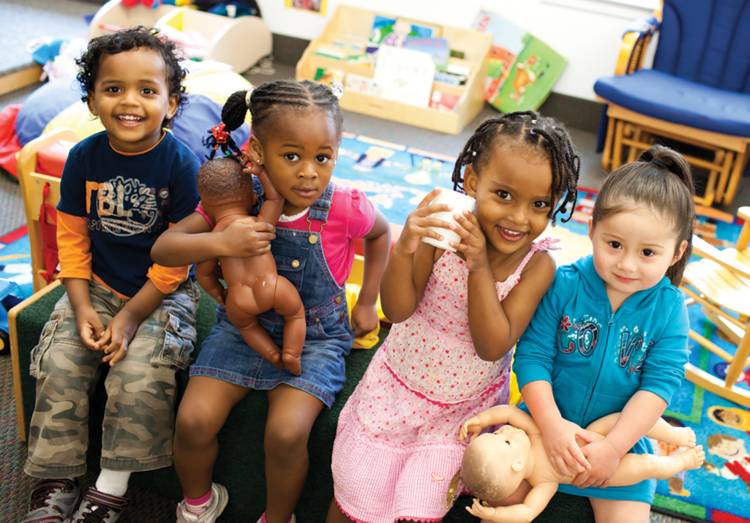
The role that early childhood education professionals play in the social– emotional development of infants and young children is critical. Photo: © ZERO TO THREE
Ms. Paradis began her career as a home visitor supporting families with young children involved in child protection proceedings. Over the last 25 years, she has provided reflective supervision/consultation to professionals from several infant– family serving sectors and has written about infant and early childhood mental health and about workforce development. Ms. Paradis is endorsed as an Infant Mental Health Mentor-Clinical by the Michigan Association for Infant Mental Health.
Kira Johnson, LCSW, has more than 20 years of experience, the last 10 years specific to children’s mental health including gaining significant experience in program development, leadership, and infant and early childhood mental health. In her various roles, Ms. Johnson has been a passionate advocate for child and family mental health, bringing high-quality services for some of the most pressing issues facing at-risk children and families in Mississippi. She has training in Eye Movement Desensitization and Reprocessing (EMDR), Trauma-Focused Cognitive Behavioral Therapy, and infant and early childhood mental health. Ms. Johnson worked for Head Start for more than 10 years as a mental health consultant, where she provided reflective supervision for Head Start teachers and administrative professionals. She earned a bachelor of science degree in psychology and a master of social work from Jackson State University.
Zsalanda Richardson, DSW, LMSW, IMH-E®, is a clinical coordinator for The Children’s Center of Wayne County in Detroit, Michigan. She has spent more than 20 years working on behalf of and advocating for both children and adults in the mental health field. Her experience includes work in adult residential homes, adult homelessness, early childhood education, youth recreation, home-based therapy, Head Start, and infant mental health. Dr. Richardson is endorsed as an Infant Mental Health Specialist through the Michigan Association of Infant Mental Health (MI-AIMH). She earned her bachelor’s degree in social work from Rutgers University and her master’s in social work from the University of Michigan. She is a recent graduate of the University of Southern California where she earned her doctorate in social work focusing on organizational change through innovative leadership and reflective supervision. Dr. Richardson has been providing reflective supervision for early childhood professionals for more than 8 years. She currently serves as the vice president for the MI-AIMH Board of Directors.
Suggested Citation
Paradis, N., Johnson, K., & Richardson, Z. (2021). The value of reflective supervision/consultation in early childhood education. ZERO TO THREE Journal, 41(3), 68–75.
References
Alliance for the Advancement of Infant Mental Health. (2018). Best practice guidelines for reflective supervision/consultation.
Bernstein, V., & Edwards, R. (2012). Supporting early childhood practitioners through relationship-based, reflective supervision. National Head Start Association, 15(3), 286–301.
Data USA. (n.d.-a). Childcare workers. https://datausa.io/profile/soc/childcare-workers
Data USA. (n.d.-b). Childcare workers: Diversity. link
Einhorn, E. (2019). “It makes us better teachers because we’re not carrying it inside”: How a Detroit preschool helps teachers cope with the stress of the job. link
Eggbeer, L., Mann, T. L., & Seibel, N. L. (2007). Reflective supervision: Past, present, and future. ZERO TO THREE Journal, 28(2), 5–9.
Emde, R. N. (2009). Facilitating reflective supervision in an early childhood development center. Infant Mental Health Journal, 30(6), 664–672.
Fonagy, P., & Target, M. (2005). Bridging the transmission gap: An end to an important mystery of attachment research? Attachment & Human Development, 7, 333–343.
For Our Babies. (n.d.). Quality infant/toddler care. link
Frosch, C. A., Varwani, Z., Mitchell, J., Caraccioli, C., & Willoughby, M. (2018). Impact of reflective supervision on early childhood interventionists’ perceptions of self-efficacy, job satisfaction, and job stress. Infant Mental Health Journal, 39(4), 385–395.
Gallen, R. T., Ash, J., Smith, C., Franco, A., & Willford, J. A. (2016). How do I know that my supervision is reflective? Identifying factors and validity of the Reflective Supervision Rating Scale. ZERO TO THREE Journal, 37(2), 30–38.
Gray, S. A. O., Forbes, D., Briggs-Gowan, M., & Carter, A. S. (2015). Caregiver insightfulness and young children’s violence exposure: Testing a relational model of risk and resilience. Attachment & Human Development, 17(6), 615–634.
Greene, K. (with LeMoine, S., & Macasaet, K.). (2021). Equity and power dynamics: Effective collaboration in infant and early childhood mental health consultation and early childhood education. ZERO TO THREE, 41(3), 59–67.
Harrison, M. (2016). Release, reframe, refocus, and respond: A practitioner transformation process in a reflective consultation program. Infant Mental Health Journal, 37(6), 670–683.
Heller, S. S., & Ash, J. (2016). The Provider Reflective Process Assessment Scales (PRPAS): Taking a deep look into growing reflective capacity in early childhood providers. ZERO TO THREE Journal, 37(2), 22–28.
Jurie, C. C. (2011). Considering care: Infant teachers, reflective function and the care environment in child care centers. Dissertations. 34, Loyola University. link
Korjenevitch, M., & Dunifon, R. (2010). Child care center quality and child development. Cornell University.
Ludden, J. (2016). Poverty wages for U.S. child care workers may be behind high turnover. National Public Radio. link
Osofsky, J. D. (2009). Perspectives on helping traumatized infants, young children, and their families. Infant Mental Health Journal, 30(6), 673–677.
Psychology Today. (n.d.). Burnout. link
Schmelzer, M., & Eidson, F. (2020). The intersection of leadership and vulnerability: Making the case for reflective supervision/consultation for policy and systems leaders. Michigan Association for Infant Mental Health’s The Infant Crier. link\
Shea, S. E. (2020). The implementation of a statewide reflective supervision/consultation model for infant-early childhood program professionals, supervisors and program managers by Pennsylvania’s Office of Child Development and Early Learning, the Pennsylvania Key and the Alliance for the Advancement of Infant Mental Health: Pilot Evaluation Report. Alliance for the Advancement of Infant Mental Health.
Shea, S. E., Jester, J. M., Huth-Bocks, A. C., Weatherston, D. J., Muzik, M., & Rosenblum, K. (2020). Infant mental health home visiting therapists’ reflective supervision self-efficacy in community practice settings. Infant Mental Health Journal, 41(2), 191–205.
Susman-Stillman, A., Lim, S., Meuwissen, A., & Watson, C. (2020). Reflective supervision/consultation and early childhood professionals’ well-being: A qualitative analysis of supervisors’ perspectives. Early Education and Development, 31(7), 1151–1168.
Thomas, K., Noroña, C. R., & Seymour-St. John, M. (2019). Cross-sector allies together in the struggle for social justice: Diversity-Informed Tenets for Work With Infants, Children, and Families. ZERO TO THREE Journal, 39(3), 44–54.
Virmani, E. A., & Ontai, L. L. (2010). Supervision and training in child care: Does reflective supervision foster caregiver insightfulness? Infant Mental Health Journal, 31(1), 16–32.
Watson, C. L., Harrison, M., Hennes, J., & Harris, M. (2016). Revealing “the space between”: Creating an observation scale to understand infant mental health reflective supervision. ZERO TO THREE, 37(2), 14–21.
Weatherston, D. J., & Barron, C. (2009). What does a reflective supervisory relationship look like? In S. Scott Heller & L. Gilkerson (Eds.), A practical guide to reflective supervision (pp. 63–82). ZERO TO THREE.
Weigand, R. F. (2007). Reflective supervision in child care: The discoveries of an accidental tourist. ZERO TO THREE Journal, 28(2), 17–22.



